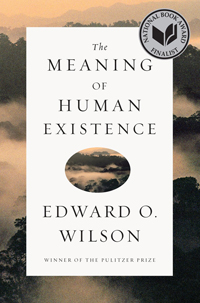Book Notes
 Edward O. Wilson, The Meaning of Human Existence (New York: W.W. Norton, 2014), 208pp.
Edward O. Wilson, The Meaning of Human Existence (New York: W.W. Norton, 2014), 208pp.
By Dan Clendenin
Edward Wilson (b. 1929) is on many short lists of the most important biologists in the world today. Since 1996 he's been an emeritus professor at Harvard, where he's spent some forty years. He's written over thirty books, two of which won Pulitzer Prizes. Wilson is also an interesting figure because he never tires of describing, including in this book, how he was born in Alabama and raised in the evangelical faith of the Southern Baptists, a faith that he rejected long ago in favor of scientific humanism.
If you're tired of the shrill rhetoric of Hitchens, Dawkins, Harris, and Dennett, and still want to read an unapologetic materialist, Wilson is a good option. He was one of the authors of the 1973 "Humanist Manifesto." He's described himself as more of an agnostic than an atheist, and in one place called himself a "provisional deist." In this and many other books he's argued for the unification, convergence, synthesis, or "consilience" of science and the humanities.
Thus the last sentence of this book: "If the heuristic and analytic power of science can be joined with the introspective creativity of the humanities, human existence will rise to an infinitely more productive and interesting meaning." In his book The Creation (2006), written as a letter to a fictional pastor, he even says that scientists ought to "offer the hand of friendship" to religious leaders and build an alliance with them, stating that "science and religion are two of the most potent forces on Earth and they should come together to save the creation."
Still, Wilson can be very hard on (organized) religion. It's the main source of violence and tribalism, an "irrational" obstacle to progress that we must outgrow. The grand narrative of science, "not the archaic version soaked in religion and ideology," is "clear and massive." To wit: "We were created not by a supernatural intelligence but by chance and necessity as one species out of millions of species in Earth's biosphere. Hope and wish for otherwise as we will, there is no evidence of an external grace shining down upon us, no demonstrable destiny or purpose assigned us, no second life vouchsafed us for the end of the present one. We are, it seems, completely alone. And that in my opinion is a very good thing. It means we are completely free." As an "accident of evolution," and with no God to save us, we must save ourselves.


